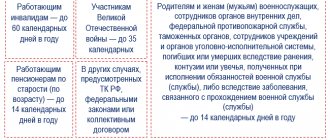The regions of the Far North are characterized by difficult living conditions associated with local natural and climatic features. Therefore, social security for citizens employed in the specified area provides numerous privileges and benefits, including a vacation trip within the Russian Federation paid for by the enterprise.
In addition to the paid days of rest provided to citizens on a general basis, an additional paid period has been established for those who work in the Far North (24 calendar days) and in equivalent regions (16 calendar days). Organizations located in these areas must reimburse employees for travel and return travel expenses from their own resources.
Who receives reimbursement for vacation travel and in what cases?
Only residents of the Far North who have official employment in the specified region of the Russian Federation can count on preferential travel.
According to the Federal Law on State Guarantees (Article 33), a trip across the territory of the Russian Federation to the place of vacation and back is paid to the employee with the company’s funds once every 2 years. When using rest days to travel across the territory of the CIS countries, payment is made if there is a corresponding clause in the employment contract drawn up between the organization and the citizen.
In accordance with the rules defined for employers in the northern zone of Russia (RF RF No. 456, 06/12/2008), reimbursement of expenses for days on the road is made taking into account certain points:
- The right to take advantage of preferential travel passes arises simultaneously with the right to receive generally accepted labor leave (according to the schedule).
- The 2 years allocated for a preferential trip are calculated in the total amount of jobs of a citizen in the North.
- Compensation is paid by the employer even upon dismissal of a citizen returning home from vacation. He is entitled to compensation for round trip travel and payment for travel to his place of residence.
- All rest days are counted as calendar days, so payment for holidays or working days is made the same.
- Payment of compensation is made based on the presentation of documents confirming the citizen’s departure from the region.
- If an employee goes on vacation with disabled family members, then their movement and transportation of luggage (up to 30 kg) are also paid for by the company.
Important! When signing an employment contract with an employer, it is advisable to indicate in the text of the document the family members of the employee who are entitled to travel compensation when going on vacation, thereby avoiding possible disagreements in the future. The definition of persons classified as family members is specified in the Federal Law on the subsistence level in the Russian Federation (No. 134, October 20, 1997).
Student social card
The student’s social card (SCU) must not be subjected to strong cooling (below –40°C) or heating (over +60°C), placed in a humid or aggressive environment, bent, exposed to mechanical loads or electromagnetic fields, or the integrity of the card’s coating damaged.
A student (or one of his parents or relatives) can pay for travel for the current calendar month and the month following the current one at any metro ticket office on any day of the month. At the same time, its validity period is recorded on the I&C.
Access to a metro station using a social card is only possible through an automatic control point (ACP) turnstile. To pass you need:
- make sure that the control device is in its original state (the red indicator is on, the green indicator is off, the information “Attach the ticket to the yellow circle” is displayed on the screen);
- place the card on either side of the control device (yellow circle) for enough time for the device to operate;
- make sure that the green indicator lights up;
- go through the turnstile;
- if the green indicator does not light up, but a sound signal is heard and there is no permission to pass (the red indicator is on, the information “Re-attach the ticket to the yellow circle” is displayed on the screen), you must re-attach the ticket to the control device, make sure that the green indicator lights up, and pass through the turnstile.
Repeated passage is possible only after seven minutes.
If it is impossible to pass, you must try to go through another turnstile. If it is impossible to pass through another turnstile, the student must check the validity period of the card at the information terminal installed in each metro station lobby. If the card has not expired, you must contact the cashier or senior cashier at any metro ticket office.
The student is personally responsible for the safety of his social card. The use of a social card for travel by other persons is prohibited. Using several preferential travel documents to travel is illegal.
In case of loss of a social card, mechanical damage to the card, loss of the PIN code, failure of the social card to work, expiration of the card, change of full name. student or the name of the educational institution (transition to another educational institution, admission to a university), when receiving a new social card made with errors, when canceling the card, you must make a new card by submitting an application through the government services portal www.mos.ru/services / or (if it is impossible to fill out the form on the government services portal) contact one of the government centers. To date, about 100 such centers have been opened in Moscow. All of them work on an extraterritorial principle, that is, students can apply to receive a social card at any center convenient for them, regardless of their place of residence or the location of the educational institution. Help desk telephone number for government centers: 8-495-587-88-88.
Provided that the card being reissued has an unexpired paid validity period, the student can contact the metro Passenger Agency windows in Service to resolve the issue of metro travel for the paid period. You must have an identification document and a re-issued card with you.
1. Service
Address: st. Staraya Basmannaya, 20, bldg. 1 Directions: to the station. metro stations "Baumanskaya", "Kurskaya" or "Krasnye Vorota".
2. Service
Address: st. 1905 Goda, no. 25 Directions: to the station. metro station “Ulitsa 1905 Goda”, then walk 10 minutes.
Phone Contact: (495) 539-54-54; 3210 (from mobile phone)
Service center operating hours: Monday-Sunday from 08.00 to 20.00 (without lunch).
ATTENTION!
When a new social card is produced, all previously issued cards that provide the right to preferential travel will be blocked, and they cannot be used to pay for travel after submitting a new application form.
Features of paying for discounted travel
On vacation, the cost of travel in both directions when traveling by transport is compensated:
- in a compartment carriage of a train (railroad);
- on an airliner;
- automobile (not counting taxi);
- water (in cabins of the 3rd category of river vessels, on sea vessels - in cabins of 5-8 tariff groups).
Luggage fees (up to 30 kg per person) are also subject to compensation.
When traveling by personal vehicle, expenses calculated based on the lowest cost of the shortest route to the final destination of the route are compensated. In this situation, the employee must submit to the accounting department of the enterprise documents confirming his stay outside the northern territories of the Russian Federation during the period under review.
Travel expenses for the vacation of the employee himself and his family members are financed from various sources. Costs for the employee are included in the cost of the organization's products (RF PP No. 661, 07/01/1995), and payments for his family members are made from the portion of the profit remaining at the disposal of the enterprise. Therefore, if the organization has no profit, payment for travel expenses incurred by the employee’s family members cannot be made.
Reimbursement for transportation costs is issued to the employee before leaving on vacation based on preliminary transportation costs, and the final payment is made based on the provided travel documents upon the employee’s (his family members) return home.
If an employee visited several settlements on the territory of the Russian Federation during the specified period, expenses are reimbursed only to one of the points (at the employee’s choice), and the return trip is reimbursed along the shortest route from the selected point.
When traveling to other countries, travel to the border of the Russian Federation and back from the border to home is paid.
The settlement point is the customs office at the exit and entry from the country (checkpoint or airport). If the nearest airport itself is located outside the northern territory, then both the employee and his family members will get to it with full travel compensation.
If an employee does not use his right to rest, then upon dismissal he is entitled to monetary compensation.
Important! Transport reimbursement benefits do not apply to rotational workers not residing in the Northern Territory.
When the right to compensation is lost
When the end of the 2-year period for the right to use the benefit approaches (1-2 months in advance), the enterprise administration notifies the employee in writing about this.
According to Decree of the Government of the Russian Federation No. 455, the opportunity to receive compensation is lost if it is not used within the allotted period. Transferring rest days or benefits to pay for transportation costs is not permitted.
Important! Employees who are not working due to childcare and pregnant employees cannot use this right. An exception will be the situation when an employee interrupts care leave and writes an application for annual leave. Then, when traveling outside the North, the cost of travel costs both ways will be compensated by the employer.
Taxation and insurance of preferential payments
Regardless of the taxation system adopted by the enterprise, compensation for employee expenses for moving across the country to their location during vacation and back is not taxed:
- tax on the income received by citizens (Article 217 of the Tax Code of the Russian Federation);
- deductions for compulsory pension or health insurance (Article 9 of Federal Law No. 212, July 24, 2009);
- contributions for insurance against industrial accidents and occupational diseases (Article 20 of Federal Law No. 125, 07/24/1998).
Exemption from taxes and insurance contributions is determined by the internal documents of the organization:
- in the amounts established in contracts (labor, collective), Regulations on days of rest;
- with the frequency specified in contracts or regulatory documents of the enterprise (at least once every 2 years);
- when providing a list of supporting documents established by the collective agreement or other documents of the organization.
When working under a simplified taxation system, the enterprise base taken into account for the calculation is not reduced by the amount of compensation expenses for employee travel on vacation (Article 346 of the Tax Code of the Russian Federation).
When paying a single tax on the difference between expenses and income, an organization can take into account preferential travel expenses for employees as part of labor costs.
What new benefit was introduced for pensioners on the bus?
On January 1, 2019, the so-called pension reform began, which involves a gradual increase in the retirement age for men and women by 5 years compared to the previously established one. In this regard, the Ministry of Labor and Social Protection of the Population proposed at the federal level and the regions to link all previously established benefits not with the fact of retirement, but with the achievement of 55 and 60 years of age by women and men, respectively.
This proposal is aimed at supporting people of pre-retirement age and minimizing financial losses for such people. Since 2021, a number of regions have already switched to this system of providing benefits, including for travel on public transport. Moscow also made this decision; all previously established benefits will be provided to Muscovites upon reaching the previously established retirement age.
In conclusion, we note that although at the federal level there are still minor benefits for some categories of pensioners for travel on public transport, most benefits are established by regional and municipal authorities. The list, volume and procedure for providing such social support measures are also established by regulatory documents at the appropriate level.
Legislation used to calculate and pay travel benefits
Orders and norms used in determining the amount and procedure for paying money for transportation expenses for workers in enterprises and organizations of the Far North of the Russian Federation must be reflected in the internal regulations of the organization and at the legislative level.
In addition to trade union regulations, labor and collective agreements, the main defining regulations are the following:
- Government Decree on the appointment of compensation for travel expenses on vacation (No. 455 of June 12, 2008).
- Labor Code of the Russian Federation:
- on the right to preferential travel once every 2 years at the expense of the employer (Article 325);
- on the right to preferential travel for those combining work and study or two jobs (Article 287);
- on the number of additional preferential days for rest (Article 321, Article 325).
- The Tax Code of the Russian Federation contains provisions on accounting for compensatory travel expenses when forming an enterprise reserve (Article 324).
- The federal law:
- No. 50 (04/02/2014) regarding the description of the procedure for providing benefits and the payment procedure;
- No. 4520 (02/19/1993) regarding the description of guarantees and compensation for those employed in labor activities in the northern regions of the Russian Federation.
Not only state employers in the Far North, but also private entrepreneurs are required to compensate their employees and their family members for traveling to their vacation destinations.
An employee receives the right to pay for transportation costs after 1 year of work in the organization and every second year thereafter (fourth, sixth, and so on), without taking into account the time of actual use of the right to rest.
An employee may receive compensation for his travel expenses for vacation not immediately at the time of acquiring the right, but in subsequent years of working activity. The amount must be paid as if using vacation for 1 year or combined for 2 years.
Important! It is undesirable to accumulate benefits for transport expenses, because the employer, for various reasons, may refuse a one-time payment for several two-year periods. If an employee files a claim, a court decision may order the employer to make payments for no more than three years, that is, the plaintiff cannot exercise the right to transport compensation for all periods except the last one.
Federal and regional travel benefits for pensioners
Federal beneficiaries in cities can enjoy free travel on all types of passenger transport (excluding taxis), and in rural areas they have the right to travel for free on suburban and intercity public transport. In addition, they have the opportunity to enjoy a seasonal discount of 50 percent on suburban rail transport.
Regional beneficiaries may be provided with either a discount on travel on public transport, or they may be completely exempt from having to pay for their trips. The possibility of preferential travel on commuter trains is not available everywhere. But in some regions of the Russian Federation, travel benefits allow pensioners to buy train and plane tickets at a discount.
Pensioners living in the Far North and similar places are given the opportunity to receive compensation once every two years for travel to their holiday destination in Russia and back. Reimbursement for travel expenses is made in accordance with the cost of cheap tickets - a reserved seat on a train, a cabin of the third category / fourth-fifth group (river / sea transport), economy class on an airplane or a seat on a general bus (except for cases when the route is served only by buses increased comfort). And one more condition: the benefit is intended for those who do not work and receive an old-age or disability pension.
So far, the government and the President of the Russian Federation have not said anything about the abolition of benefits and compensation in 2021 due to the difficult economic situation in the country. All federal benefits remain in full. However, regional authorities may reduce the number of benefits provided due to the inability to finance them in full. Thus, back in mid-2015, it was announced that preferential travel for pensioners in Moscow and the Moscow region would be cancelled.
Changes are possible, so those pensioners who “every penny counts” need to constantly monitor news about social programs of federal and local authorities and respond to all innovations in a timely manner.
How to apply for compensation for travel on vacation
In order to count on reimbursement for travel expenses on vacation, an employee of northern enterprises going on vacation should write a statement to their management. He will still write it without fail to go on vacation. It is only necessary, in addition to the usual mandatory points, to additionally include some data there:
- the place where a person is going to go on vacation;
- the type of transport he will use to get there;
- the cost of travel along the shortest route;
- references to legislative acts according to which he is entitled to this payment.
It is necessary to attach copies of tickets or boarding passes to your vacation destination (airplane, train, water transport), as well as checks for payment for baggage transportation.
If a person drives his own car, the application will need to be accompanied by:
- a certificate stating that he actually visited the declared vacation spot;
- a copy of the license and registration certificate for the car;
- receipts for gasoline received at gas stations along the way.
Upon receipt of this application, the head of the organization issues a special order, which is the basis for the personnel department and accounting department when calculating and paying vacation funds.
Proof of expenses must be submitted at least three days before departure. Upon return, a recalculation may be made.





